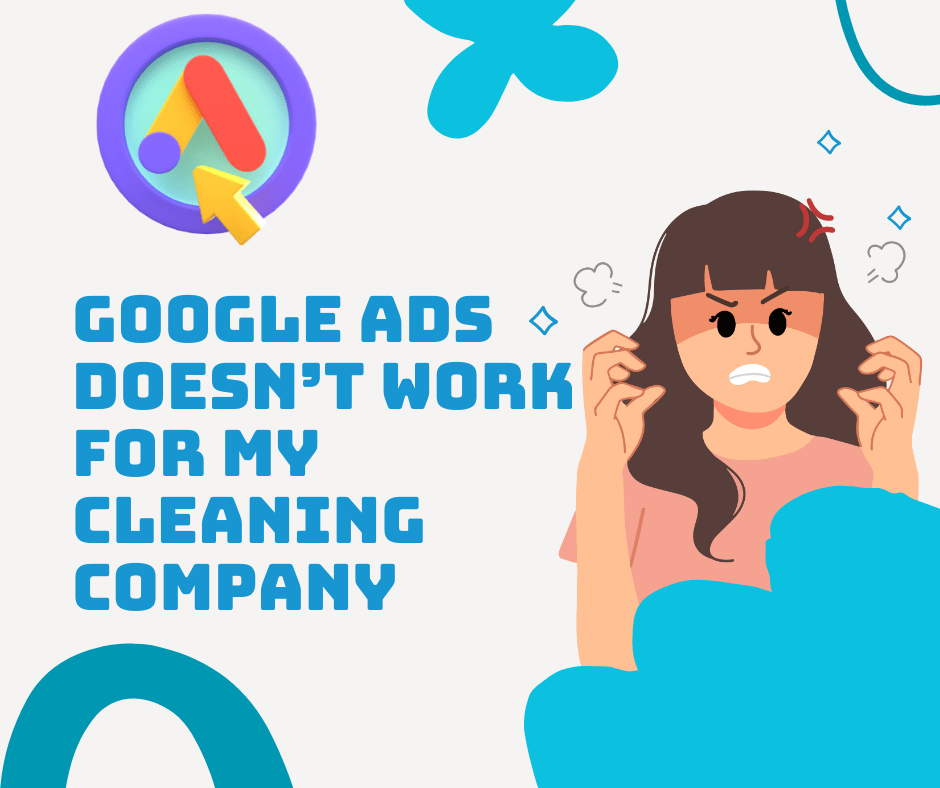Running Google Ads can be an excellent way for UK cleaning companies to generate leads, but for many business owners, it can feel like they’re spending money without seeing results. Often, they give up after following advice from so-called “gurus” or trying to reach an audience that is too broad. The key to making Google Ads work for your cleaning company is using the right keywords and match types.
In this guide, we’ll explain why your ads might not convert, why your conversion costs are higher than they should be, and how to optimise your campaign. If you’re struggling with low returns, we’ll also show you how to fix it without blowing your budget.
1. Broad Match Keywords: Wasting Your Budget
One of the most common mistakes cleaning companies make is using broad-match keywords. A broad match might sound appealing because it allows your ads to show various search terms, but this is also its biggest drawback.
What Happens with Broad Match:
Let’s say you’re using the broad match keyword “cleaning services”. Your ad could be shown for searches like:
- “car cleaning services”
- “cleaning products”
- “cleaning jobs”
None of these searches are relevant to a cleaning company looking for domestic or commercial clients, but you’ll still pay for those clicks. These irrelevant clicks drive up your ad spend without delivering new business.
The Impact:
- Higher Costs: You’ll end up paying for clicks from people not looking for your services.
- Lower Conversion Rates: When people searching for “cleaning jobs” click on your ad, they aren’t going to book your service, meaning your conversion rate drops.
Solution: Use phrase match or exact match instead. These ensure your ad is only shown to people searching for services directly related to your business. For example:
- A phrase match for “domestic cleaning services London” will trigger only when someone searches for that specific term or close variations.
- Exact match will trigger only for searches that match your keyword exactly, giving you the most control.
2. Targeting Too Broad an Audience
Another common pitfall for cleaning companies is targeting an audience that is too broad. This can happen when businesses set their ads to show large geographic areas or general cleaning-related terms.
What Happens with Broad Targeting:
If you target all of London with general keywords like “cleaning services,” your ad may be shown to people too far away to consider hiring your business. Even if they click on your ad, they’re unlikely to convert because they’re out of your service area.
The Impact:
- Low Conversion Rates: You’ll get clicks from people who aren’t likely to book your services.
- Wasted Ad Spend: You’ll pay for clicks that don’t result in new customers.
Solution: Narrow your targeting. Focus on the specific areas where your cleaning company operates. For example, if you provide cleaning services in South London, don’t target all of London. Use location targeting to focus on your exact service areas.
3. Trusting So-Called “Gurus” Without a Plan
There’s no shortage of online advice from self-proclaimed marketing “gurus” who claim to have the secret to Google Ads success. Many cleaning businesses follow these generic strategies, only to find their budget drained with little to show.
What Happens with Guru Strategies:
These “gurus” often promote vague, one-size-fits-all strategies that don’t consider the unique needs of UK cleaning businesses. Their advice may include using broad-match keywords, targeting general audiences, or throwing as much money as possible at ads without considering conversion rates.
The Impact:
- High Ad Costs: You spend far more than you need to without seeing meaningful results.
- Frustration: Many business owners abandon Google Ads, assuming it doesn’t work for them.
Solution: Follow a plan that’s specific to your business. Start small, target specific areas, and use keywords and match types. Measure your results and adjust your campaign over time based on what works.
4. Ignoring Negative Keywords
You’re missing a huge opportunity to save money and improve your ad performance if you’re not using negative keywords. Negative keywords are terms that you don’t want your ad to show for.
What Happens Without Negative Keywords:
If you don’t add negative keywords, your ads could be shown for searches that have nothing to do with your business. For example, if you offer domestic cleaning services but don’t exclude terms like “cleaning jobs,” you’ll pay for clicks from job seekers rather than potential customers.
The Impact:
- Wasted Ad Spend: You’re paying for clicks irrelevant to your business.
- Low Conversion Rates: Even if people click on your ad, they’re not likely to become customers because they were searching for something else.
Solution: Add negative keywords like “jobs,” “employment,” “products,” or “car” to your campaign. This will prevent your ad from appearing for irrelevant searches, saving you money and increasing your conversion rate.
5. Not Tracking Conversions Properly
Another issue cleaning companies face is not tracking their conversions properly. You can’t optimise your campaign effectively if you don’t know which keywords, ads, or locations are driving conversions.
What Happens Without Tracking:
You’ll spend money on ads without knowing whether they’re working. Making informed decisions about your Google Ads campaign without tracking which elements drive results is impossible.
The Impact:
- Wasted Budget: Without proper tracking, you could spend money on underperforming keywords or ads.
- Missed Opportunities: You won’t be able to see which parts of your campaign are most successful, so you won’t know where to focus your budget.
Solution: Set up conversion tracking in Google Ads. This will help you see which ads lead to bookings, inquiries, or calls so you can focus your budget on what works.
If you want to improve your Google Ads skills, why not check out Google’s free course on Google Ads? It’s a great way to learn the fundamentals and ensure your ads perform at their best.
